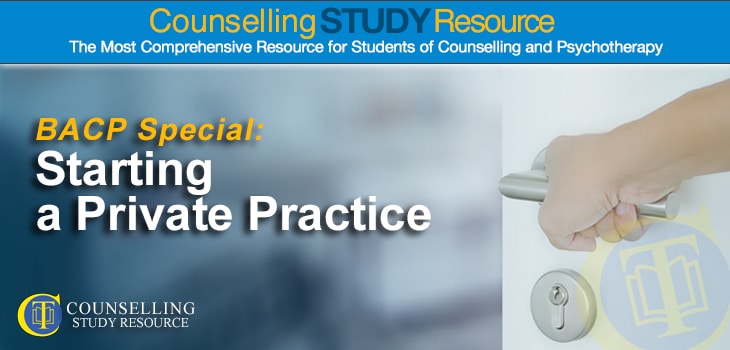157 - BACP Special: Starting a Private Practice in Counselling
During the academic breaks, the Counselling Tutor Podcast returns periodically with special editions - and this time, Ken Kelly and Rory Lees-Oakes discuss what you need to consider when starting a private practice in counselling.
Rory interviews Jo Langston (Ethics Services Manager) and Caz Binstead (a member of the Private Practice Divisional Executive) at the British Association of Counselling and Psychotherapy (BACP) about the resources available to help you, and the ethical issues to consider.
Setting up as a private-practice therapist may be something you are currently thinking about. There are lots of different aspects to think about before taking the plunge. Being proactive is vital, rather than reacting later when a problem occurs.
Ethical considerations around working in private practice include:
- working within your competence - in particular regarding assessment, which you may not have experienced when working in an agency
- dealing with the isolation of working alone, with reduced support and increased responsibilities compared to agency working
- writing and applying your own contract
- making business decisions.
The BACP offers a range of resources to support you in setting up and running your own practice, including the Private Practice Toolkit, which comprises four modules:
- setting up your private practice
- managing your private practice
- developing your private practice
- working as a private practitioner.
Remember that you don't know what you don't know, so do get feedback from others ... Once you've prepared as fully as possible, don't be afraid of making mistakes, use the resources available, and draw on your support network.
There are various kinds of ethical difficulties that could crop up specifically in private practice, including those relating to:
- realising, as the counsellor, several sessions into working with a client that you can't continue to do so (e.g. for reasons of competence in relation to the client's presentation)
- taking payment for sessions and dealing with clients who don't pay
- safe lone working, especially if you are working from home
- marketing your services
- setting and building your own caseload
- setting and maintaining appropriate boundaries.
The presenters discuss these issues, and ways to approach them in order to minimise the risk of any problems when starting a private practice in counselling.
Again, the BACP has resources that can support you with any dilemmas related to these themes, including guidance on making defensible ethical decisions.
In conclusion, Jo suggests that counsellors thinking of entering private practice consult, prepare and take their time.
Remember that you don't know what you don't know, so do get feedback from others - in particular your supervisor - to increase your awareness of areas that you need to develop in order to be able to work ethically and safely in private practice.
Caz adds that it's good never to stop learning. Once you've prepared as fully as possible, don't be afraid of making mistakes, use the resources available, and draw on your support network.
Watch out for another Counselling Tutor Podcast special with BACP soon.
In the meantime, check out Rory's handout here.



Very interesting and thought provoking, thank you.
Thank you I found this podcast really valuable
Thank you. Very useful indeed.
Glad you enjoyed it:)